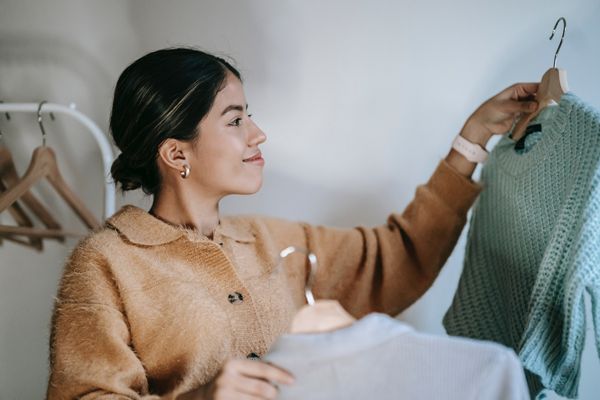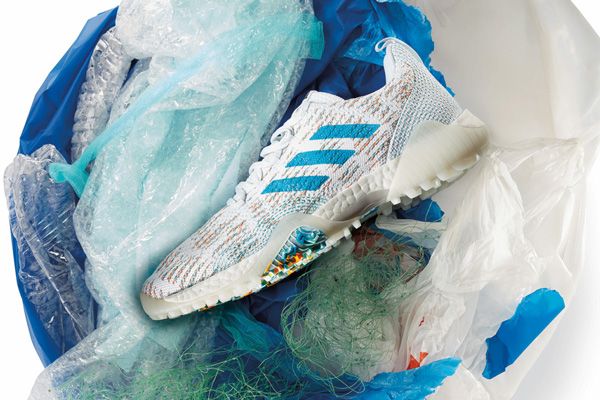As consumers become more aware of the damage caused by the excessive production of consumer goods like electronics, fashion, and beauty, they are increasingly demanding more ethically sourced and produced products. Industries and brands now have a real need to develop more transparent and sustainable processes.
Reducing the negative impact on the environment, and more broadly the wider global society, starts with individuals making a small difference, one way being to build a sustainable wardrobe.
So, what is Sustainable Fashion?

Sustainable fashion is a social consumer movement dedicated to fostering change in fashion products and the fashion industry as a whole.
By working to shift consumer trends and behaviours through education and practical advice, sustainable fashion aims to create social, cultural, and ecological change through the buying power of the consumer.
Taking a more sustainable approach to fashion means considering the perspective of all aspects of the garment production process, from factory workers to users and producers and the wider environment.
Fast fashion: someone’s gotta change

Understanding why sustainability is important is the first step to doing something about it. Our increasingly globalised world combined with our perpetual desire for new has resulted in fashion trends coming and going quicker than ever before. In the last 20 years alone textile production has increased by 400%.
Unfortunately, the pursuit of keeping up with the latest trends has led the fashion industry to adopt questionable production processes that destroy the environment, create inhumane working conditions, and result in low-quality clothing. These inexpensive and low-quality garments produced frequently at scale by mass-market retailers are what we call fast fashion.
The fashion industry uses 1.5 trillion litres of water a year
From producing cotton to the process of dying materials, water is an important raw material used in the process of making clothes. The amount of water needed to produce garments is enormous, with the fashion industry using about 1.5 trillion litres a year. Water being a scarce resource in many parts of the world means that countries are often left to decide whether water supplies are dedicated to the production process or to its own people. As a result, there are increasing rates of desertification and the amount of people who don’t have access to clean drinking water is increasing.
Fast fashion doesn’t just result in an overuse of water, it also contributes to making a lot of water unusable. Clothing makes up a large percentage of the pollution that ends up in landfill and our waterways. 85% of human-made debris that litter our coastal shores are made up of microfibres from clothing. Synthetic fibres such as polyester are plastic fibres and can take up to 200 years to decompose.
Child labour is often a solution to lower production costs
Global supply chains have allowed fashion retailers in the West to shift their production processes to developing nations where it is more efficient to manufacture clothing. But as a result, a lot of these production sites are guilty of exploiting their workers, and in some cases using child labour to maintain low costs whilst being forced to work in unsafe environments that lack ventilation for 16 hour days, seven days a week.
Fast fashion has an incredibly negative impact on the world and consumers are starting to notice. Across the world, there is now a growing consumer consciousness that things can’t stay the same. The rise of sustainable fashion is an important way everyday consumers can support the fashion industry towards greater ecological integrity and social responsibility.
Three ways to make more sustainable fashion choices

Making ethical fashion decisions can be simple and slow, but the flow-on effect can make a real difference when working to solve the problems that fast fashion brings with it.
Change your relationship with fashion
Going for quality over quantity is the first step to becoming more sustainable. While this usually means paying more for an outfit, it does mean you’re likely to have it for a longer period of time. Buying 15-30 high-quality items a year, rather than 60 cheaper, less environmentally friendly pieces will help reduce your fashion footprint.
Additionally, if you are buying fewer higher quality items - look after them properly! It sounds obvious but the more you care for your clothes, the longer they will last. Check the tags on them to see the best way to wash and dry them.
Buying clothes second-hand is another great way to reduce your fashion footprint while also buying higher quality items. Fast fashion rarely has the quality to make it to a vintage store. Next time you need something new, why not visit an op-shop first!
Learn more about sustainable fashion
Sometimes it can be difficult to know where to start. An easy way to begin your sustainable living discovery is to start with your favourite brand or products. Learn about how and where they make their products and what materials they use to make them. Organisations like B-Corp are a great place to reference to check if your favourite brands meet the rigorous criteria in order to be considered “sustainable”. If your favourite brand’s production practices don’t meet your sustainability standards, you can also find some great alternative brands that are.
Support sustainable fashion brands that are improving their offering
When you do have to purchase a new piece of clothing, supporting brands that have built their entire business around a sustainable production process is a great way to help change the culture around fast fashion.
At Cashrewards, sustainable fashion is important to us which is why we partner with brands that are making real changes to their production processes.
David Jones

Newer, smaller, and more independent sustainable brands can be hard to find, but David Jones has made it easy to find sustainable clothing through the Mindfully Made collection online. It is here that you’ll see David Jones’ dedication to connecting customers with sustainable fashion, beauty, home, and food products, all made with sustainable materials. One of the most exciting elements of Mindfully Made is that it is home to many great eco-friendly Australian brands such as Bassike, Nobody Denim, and Viktoria & Woods.
Kathmandu

B-Corporations are a new kind of business that balances both purpose and profit, in 2019 Kathmandu became Australia’s largest. This means that they are legally required to consider the impact of their decisions on their workers, customers, suppliers, community, and the environment. As a certified B-Corp, they have met the highest standards of social and environmental performance and have pledged to be actively “using business as a force for good”.
Adidas

The sportswear giant Adidas has an ambitious goal of using 100% recycled polyester in all their products by 2024. And while the brand isn’t at a B-Corp status, it is however taking active steps to change how they do things. Their incredible PrimeBlue eco-friendly product range includes tracksuits, shoes, and activewear that are all made with plastic waste pulled from the ocean.
By supporting the sustainability efforts of both smaller independent brands and larger global brands you can help to eradicate the popularity of fast fashion and help encourage the wider fashion industry to become more ecologically and socially responsible tomorrow.
When it comes to making more sustainable fashion decisions Cashrewards makes it easy, partnering with brands who are making this change. Browse the hundreds of fashion and clothing retailers on our platform, and save the planet and save money at the same time.



